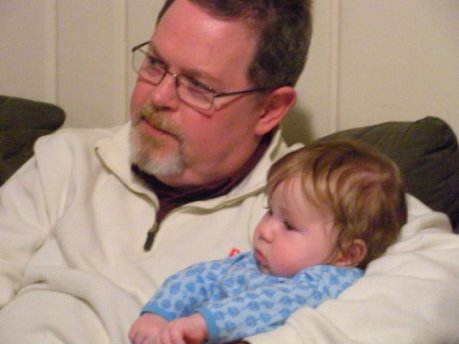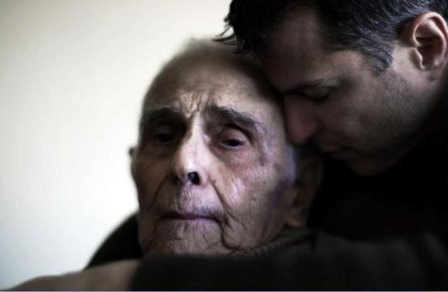by the Night Writer
Two years ago today the 35W bridge collapsed, drawing attention not only from across the state of Minnesota but also across the country and even the world. When I was in Spain a couple of weeks ago I was talking to an engineer from Madrid and when he found out I was from the Minneapolis area the first thing he wanted to talk about was the bridge collapse. Since the collapse a new bridge has risen, bigger and stronger than the original, the marks of the disaster now largely out of sight underneath the waters of the Mississippi River, just as the scars in the lives of those who survived — or in the lives of the loved ones of those who didn’t — are largely lost to our sight now.
At the time I suggested here (see below) that in the fall of concrete and metal something better and purer might arise, not made by the hands of man, but in the way those hands reached out. Today a new bridge stands, better than ever, where the old one fell. Two years later my question to you is, “Can we say the same thing?”
The bridges of Minneapolis and San Luis Rey, and the Tower of Siloam
Who, what, when, where? Those are the first things we want to know when a disaster makes the news. Close on their heels comes the question hardest to answer: Why?
That question breaks into two parts, the physical and the metaphysical. Why did the bridge fail structurally, and why were these particular people apportioned to survive, die or be injured? The first question will eventually be known to the millimeter; the second will remain fuzzy. Implicit in the second one, however, is the fear that everything is random, that there is no justice, or that justice is applied on a scale so grand that we can’t calculate it; either way we are left with uncertainty as to just what measure is due us personally. The thing is, we want there to be a reason and order to things, and optimistically assume (or hope) that our own accounts will balance to the “good”; promising or justifying our own deliverance from calamity.
We easily extend our version of grace to others (as long as they’re victims and not members of the opposition party), generously judging them good or innocent by the most general of categories: he was a “nice guy”, she was a young mother. “Why do bad things happen to good people?” we cry. Other people, or other times, might view calamity as judgment or karmic justice.
Similarly, was it chance or God’s plan that resulted in the deaths in the collapse of the 35W bridge in Minneapolis? Was it God’s indifference that lead to the fall, or God’s providence that the calamity was not more catastrophic? If there is such a “goodness” scale, by what measure can the survivors claim deliverance and what comfort can be given to the families of those who didn’t? How can a former missionary go missing while a child abuser survives?
People didn’t start asking these questions just when President Bush took office, either. In his 1927 novel, “The Bridge at San Luis Rey,” Thornton Wilder tackles similar questions and circumstances in the person of Brother Juniper who tries to ascertain the central failing in the lives of five people who perish when the titular bridge falls into a chasm. (He could come to no conclusion). Going back a bit further, in John 9:2, Jesus was asked about a blind man, “Who sinned, this man or his parents, that he was born blind?”
“Neither this man nor his parents sinned,” said Jesus, “but this happened so that the work of God might be displayed in his life.” Whereupon he made mud and put it in the blind man’s eyes and then sent him to wash in the pool of Siloam, healing his blindness. Interestingly, Siloam is mentioned again in Luke 13 when people suggest to Jesus that calamity overcame certain people as a judgment. His response: “… those eighteen on whom the tower in Siloam fell and killed them, do you think that they were worse sinners than all other men who dwelt in Jerusalem? I tell you, no! But unless you repent, you too will all perish.”
Or, (excuse my jump in character but not in context), in the words of Clint Eastwood in Unforgiven, “We’ve all got it coming.” The point being made was that no one is innocent, but each may come to the revelation of salvation by grace; by the work of God, not man.
I’m not trying to be dark. In fact, I believe that there is an order and justice in the universe even if we can’t see it all at once. I believe that because, in fact, we are able to see beauty and justice from time to time. If it weren’t so, all would be chaos and despair. Instead, in the midst of the refining fire of a disaster there are gleaming streaks of gold rising through all the impurities; the acts of courage, altruism and goodness in the survivors and rescuers (perhaps even unplumbed in their lives up until that point), and of a community pulling together in empathy and faith.
Bridges are aspirational; tangibly they are an example of our ability to overcome an obstacle to achieve what we want. The failure of one is not just a challenge to getting what we want, it is a repudiation of our ability to even conceive of it; the cutting of the tightrope woven of our doctrines that we walk to find our own salvation. In Mark Helprin’s book “Winter’s Tale” the allegorical and eternal Jackson Mead, an engineer representing either Lucifer or man (I go back and forth on this), strives to bend steel, nature and his will into casting a tremendous bridge of light to Heaven that — like our human understanding — touches the far shore for a moment and falls. Yet one of the messages of the book is that the balances are exact; and one thing cannot fall without something else rising and even more gloriously.
The 35W bridge fell in a crush of broken steel, concrete and bodies — and though the dust sought to obscure it, we could suddenly see something clearly: we are the bridges, standing in or reaching across the gap for and to one another.
Standing, always.














